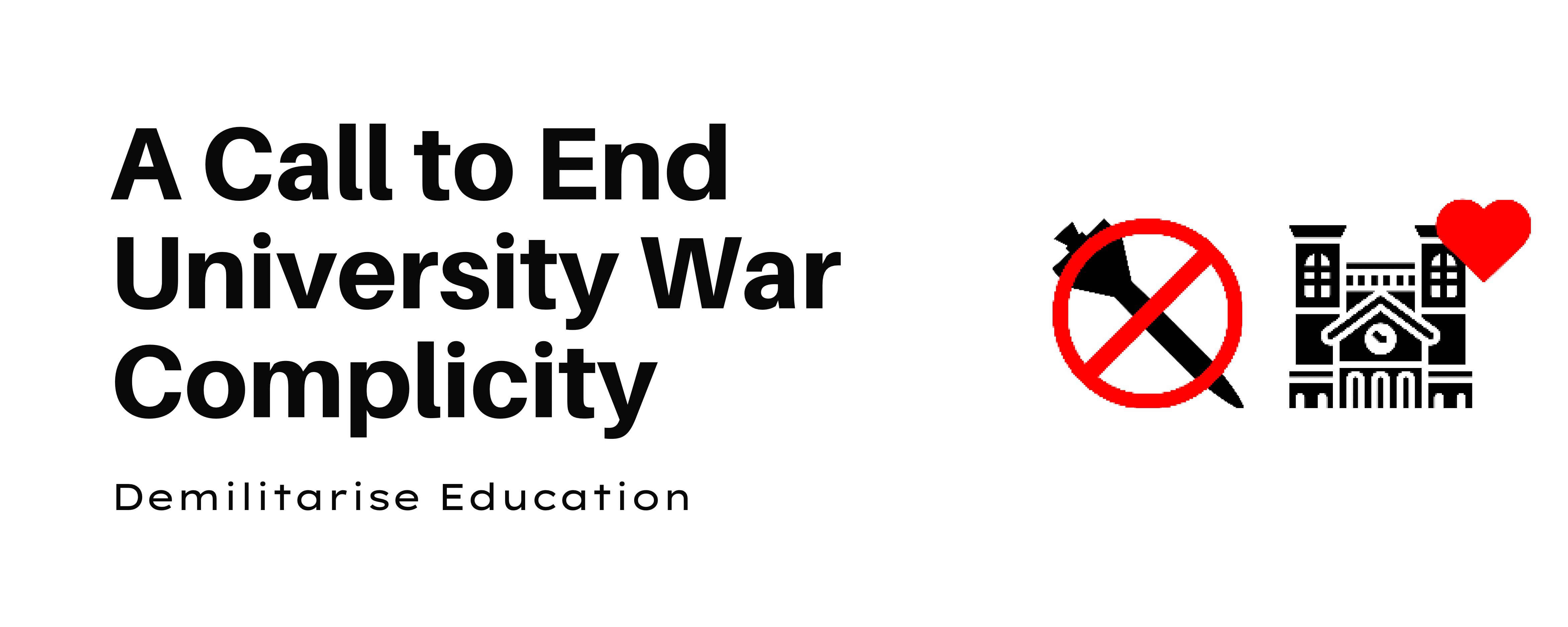A Call to End University War Complicity
UK University Leadership

Every day, more people die from armed conflict. UK Universities are complicit in this.
We are calling institutions to restore their sites as places of research and learning for the public good, not war.
That begins with one powerful step: cutting ties with the arms industry.
This open letter must reach at least 1,500 signatures to be presented to leadership at every UK university.
Please only sign if you have a direct affiliation to a UK University/Higher Education (students, staff, alumni) or are a representative of a non-governmental group or nonprofit organisation.
For all those not represented by the above, please instead sign The dED Petition.
Read the full open letter below and add your name to this historical call.
Sponsored by
To:
UK University Leadership
From:
[Your Name]
Dear UK University Leadership,
This open letter, signed by students, staff, alumni, and the wider knowledge community, calls for urgent, principled action. We present the Demilitarise Education (dED) Treaty—a practical framework to help universities end all investments and partnerships with the arms trade.
Universities’ ties to the arms industry reflect a model shaped by state and corporate power—not the public good. These relationships fuel global instability, injustice, and environmental harm. By adopting the dED Treaty and centring ethics, transparency, and democracy, universities can reclaim their role as spaces for peace and social responsibility.
The dED Universities & Arms Database reveals links between 138 UK universities and arms companies, including private weapons manufacturers and military bodies. Since 2017, over £2 billion has flowed into research and institutional partnerships with these entities.
This entanglement shifts research priorities toward military and commercial interests, undermines academic freedom, and erodes the ethical foundations of higher education, placing universities in breach of human rights, environmental, and legal commitments.
Arms companies supply weapons used in conflicts like Yemen and Gaza, contributing to human rights violations, war crimes, and environmental destruction (see sources).
Although accused in 2019 of ‘aiding and abetting’ war crimes, UK universities maintain ties with BAE Systems, worth at least £940,000 in direct investments, £3.36 million in academic partnerships, and £130 million in research partnerships (dED, 2025). BAE is just one of many arms firms embedded in UK higher education.
Universities risk complicity in militarism through ties to the arms trade. We, the signatories, reject all institutional links to the military-industrial complex and call for their immediate dismantling across investments, research, and academic partnerships.
Your community demands democratic governance that rejects militarism and restores the university’s role in serving the public good. The dED Treaty offers a practical, adaptable path to make this change real and replicable.
Treaty Adoption Means:
Disclose for accountability: Publicly disclose all existing ties with the military-industrial complex. This includes direct investments, academic, and research partnerships with arms manufacturers, as well as companies known to enable weapons development (SIPRI Top 100 and Defence News Top 100 arms-producing companies).
Review with inclusion: Include students and staff in reviewing and implementing arms exclusions in policies related to investments, academic and research partnerships.
Act with commitment & compliance: Agree to form no new arms partnerships and make a public statement showing a long-term commitment to comply with the dED Treaty.
Universities like York and King’s College, Cambridge have begun to exclude arms companies from investments—setting a precedent for ethical leadership. But true accountability demands more: ending all ties to arms companies through robust policy reform.
We invite open dialogue to help build a university system grounded in ethics, integrity, and a just, peaceful future.
In solidarity,
Concerned members of the UK Knowledge Community
___________________________
Sources and Links
___________________________
The Demilitarise Education Treaty: https://ded1.co/how-we-do-it/treaty
The Demilitarise Education Universities & Arms Database: https://ded1.co/data/university
SIPRI Top 100: https://www.sipri.org/visualizations/2024/sipri-top-100-arms-producing-and-military-services-companies-world-2023
Defence News Top 100: https://www.defensenews.com/top-100/
BAE Systems has supplied weapons and technology used in serious violations of international law—accused in 2019 as ‘aiding and abetting’ war crimes in Yemen in a submission to the International Criminal Court, as detailed in a 350-page by the European Centre for Constitutional (ECCHR, 2020), and alongside Amnesty International, Mwatana and other NGOs (Amnesty International, 2019; Sabbagh, 2020). Saudi forces have used BAE’s Typhoon and Tornado jets and Paveway IV bombs in Yemen (CAAT, 2023), where airstrikes have killed over 8,000 civilians (Hall, 2019) and contributed to a humanitarian crisis that has claimed more than 377,000 lives (AFP, 2021). Indonesia used BAE Hawk jets during its occupation of East Timor, which saw over 100,000 deaths (Guardian, 1999), and other BAE equipment supported Bahrain's violent crackdown on protesters in 2011 (CAAT, 2011). In Gaza, BAE-manufactured components for F-35 fighter jets have been used in Israeli bombing campaigns (Hui, 2025), which killed over 4,000 Palestinians, including hundreds of children, in 2021 and 2023 (Al Jazeera, 2023). Since October 2023, at least 50,021 Palestinians have been killed and over 113,000 injured, according to Gaza’s Health Ministry (Aljazeera, 2025). By arming regimes engaged in indiscriminate violence, BAE has directly contributed to war crimes, mass civilian deaths, and large-scale environmental destruction. Yet, while it reports on production emissions and business travel, BAE fails to account for the catastrophic environmental harm caused by its weapons, including toxic pollution, infrastructure collapse, and long-term ecological harm.
ECCHR, 2020: https://www.ecchr.eu/fileadmin/Q_As/QA_ICC_arms_Yemen_ECCHR_CAAT_Mwatana_Amnesty_Delas_Rete.pdf?
Amnesty International, 2019: https://www.amnesty.org/en/latest/press-release/2019/12/icc-investigate-arms-companies-yemen-war-crimes-allegations/
Sabbagh, 2020: https://www.theguardian.com/business/2020/apr/14/bae-systems-sold-15bn-arms-to-saudis-during-yemen-assault
CAAT, 2023: https://caat.org.uk/homepage/stop-arming-saudi-arabia/uk-arms-used-in-the-war-on-yemen/
Hall, 2019: https://www.independent.co.uk/news/world/middle-east/yemen-war-airstrikes-uk-bombing-death-toll-civilians-saudi-arabia-a8840516.html
AFP, 2021: https://www.france24.com/en/live-news/20211123-yemen-war-will-have-killed-377-000-by-year-s-end-un
CAAT, 2011: https://caat.org.uk/news/2011-03-16-2/
Guardian, 1999: https://www.theguardian.com/world/1999/sep/09/indonesia
Hui, 2025: https://apnews.com/article/uk-britain-israel-f35-jets-arms-export-979e8953d2b7b0972be15de3822331fc
Al Jazeera, 2025: https://www.aljazeera.com/amp/news/2025/3/23/israeli-offensive-in-gaza-has-killed-50000-palestinians-since-october-2023
Ambrose, 2024: https://www.yorkvision.co.uk/news/the-university-of-york-cuts-ties-with-arms-investors/01/05/2024
Mulla, 2025: https://www.middleeasteye.net/news/kings-college-cambridge-divest-millions-occupation-and-arms-industry
